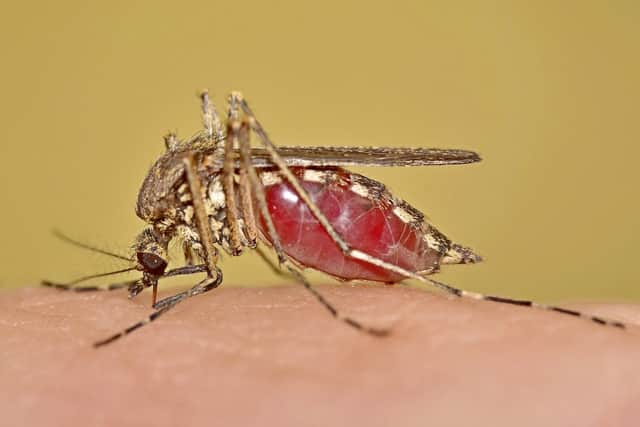'It fed on me for about a minute' - Edinburgh nature photographer snaps close-up image of mosquito on shore of Duddingston Loch
and live on Freeview channel 276
But one avid photographer managed to capture the moment a mosquito stopped to feed on the back of his hand - in Edinburgh of all places.
David Stevens, who lives in Currie, used a macro lens camera to enlarge the image of the insect as it pierced his skin on the southern shore of Duddingston Loch, in the Scottish Wildlife Trust’s (SWT) Bawsinch Nature Reserve.
Advertisement
Hide AdAdvertisement
Hide AdThe 69-year-old, who has been volunteering for the SWT for around five years and enjoys photographing nature, said: “They (mosquitoes) are obviously quite mobile and, unless it landed on an animal and stayed still you couldn’t get a photo but, because this one chose my hand and it stuck in its proboscis (mouth) it was basically anchored.


“It fed for about one minute, which was enough time for me to get seven or eight photos. I was left with a wee bump afterwards but it doesn’t really bother me.
“I was very pleased to get that photo because they fly around a lot.”
David’s close-up image was recently shared by The British Nature Guide on Twitter but was actually taken late last summer on what he recalled to be a very warm day.
Advertisement
Hide AdAdvertisement
Hide AdHe said the mosquito species pictured is culiseta annulata which has distinct white markings on its legs and is endemic in Scotland.
David said he has seen these mosquitoes before around Duddingston Loch as it is the “perfect” breeding ground with a number of stagnant pond areas around it.
Mosquito bite prevention expert, Howard Carter, says that culiseta annulata numbers are increasing across the UK, including in Scotland. He says this is partly down to climate change but also because there are more people now to feed off than there were several decades ago.
And he said that, during lockdown this year, mosquitoes have been thriving in areas of stagnant water – from hotel water features and unattended swimming pools and ponds to discarded bottle caps containing water.
Advertisement
Hide AdAdvertisement
Hide AdMr Carter, who founded PMD insect repellent company Incognito, said demand for their products has shot up this summer amid research from the Defence Science and Technology Laboratory suggesting a product called Citriodiol, found in insect repellent, can kill the strain of coronavirus which causes Covid-19.